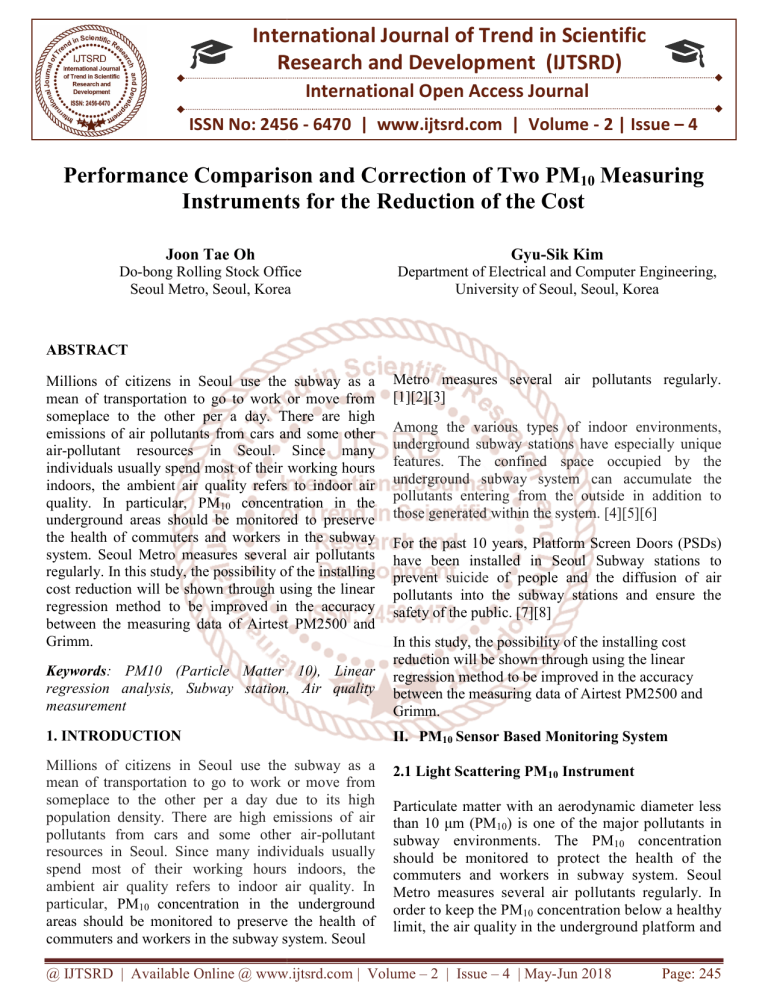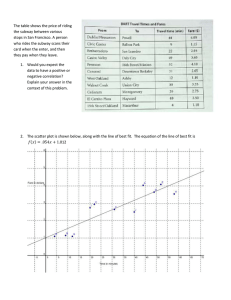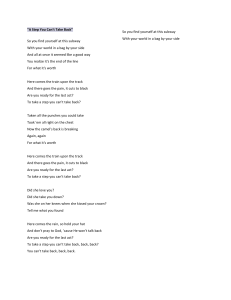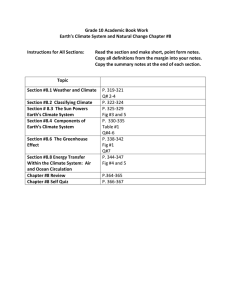
International Journal of Trend in Scientific
Research and Development (IJTSRD)
International Open Access Journal
ISSN No: 2456 - 6470 | www.ijtsrd.com | Volume - 2 | Issue – 4
Performance Comparison and C
Correction
orrection of Two PM10 Measuring
Instruments for the Reduction of the Cost
Joon Tae Oh
Gyu-Sik
Sik Kim
Do-bong
bong Rolling Stock Office
Seoul Metro, Seoul, Korea
Department of Electrical and Computer Engineering,
Eng
University of Seoul,, Seoul, Korea
ABSTRACT
Millions of citizens in Seoul use the subway as a
mean of transportation to go to work or move from
someplace to the other per a day. There are high
emissions of air pollutants from cars and some other
air-pollutant resources in Seoul.. Since many
individuals usually spend most of their working hours
indoors, the ambient air quality refers to indoor air
quality. In particular, PM10 concentration in the
underground areas should be monitored to preserve
the health of commuters and workers in the subway
system. Seoul Metro measures several air pollutants
regularly. In this study, the possibility of the installing
cost reduction will be shown through using the linear
regression method to be improved in the accuracy
between the measuring data of Airtest PM2500 and
Grimm.
Metro measures several air pollutants regularly.
[1][2][3]
Among the various types of indoor environments,
underground subway stations have especially unique
features. The confined space occupied by the
underground subway system can accumulate the
pollutants entering from the outside in addition to
those generated within the system. [4][5][6]
For the past 10 years, Platform
latform Screen Doors (PSDs)
have been installed in Seoul Subway stations to
prevent suicide of people and the diffusion of air
pollutants into the subway stations and ensure the
safety of the public. [7][8]
Keywords: PM10 (Particle Matter 10), Linear
regression analysis, Subway station, Air quality
measurement
In this study, the possibility of the installing cost
reduction will be shown through using the linear
regression method to be improved in the accuracy
between the measuring data of Airtest PM2500 and
Grimm.
1. INTRODUCTION
II. PM10 Sensor Based Monitoring
Mon
System
Millions of citizens in Seoul use the subway as a
mean of transportation to go to work or mo
move from
someplace to the other per a day due to its high
population density. There are high emissions of air
pollutants from cars and some other air
air-pollutant
resources in Seoul. Since many individual
individuals usually
spend most of their working hours indoors, the
ambient air quality refers to indoor air quality
quality. In
particular, PM10 concentration in the underground
areas should be monitored to preserve the health of
commuters and workers in the subway system. Seoul
2.1 Light Scattering PM10 Instrument
Particulate
articulate matter with an aerodynamic diameter less
than 10 μm (PM10) is one of the major pollutants in
subway environments. The PM10 concentration
should be monitored to protect the health of the
commuters and workers in subway system. Seoul
Metro measures several air pollutants regularly. In
order to keep the PM10 concentration below a healthy
limit, the air quality in the underground platform and
@ IJTSRD | Available Online @ www.ijtsrd.com | Volume – 2 | Issue – 4 | May-Jun
Jun 2018
Page: 245
International Journal of Trend in Scientific Research and Development (IJTSRD) ISSN: 2456-6470
tunnels in subway should be monitored and
controlled continuously, the PM10 instruments using
light scattering method can measure the PM10
concentration in two minutes. However, the accuracy
of the instruments using the light scattering method
has still not been proven completely since they
measure the particle number concentration rather
than the mass concentration. Fig.1 shows the
principle of the light scattering method for PM10
instruments. [9][10]
2.2 Performance Comparison and Analysis
Fig.3 shows a comparison of measuring PM 10
between a particle matter instrument of Airtest
PM2500 and Grimm which were installed in a lab in
University of Seoul. These instruments were
measured in two minutes interval for two days. As
shown in Fig.3, the measurement results of PM 10 have
a significant deviation between them.
Fig.3. PM10 concentration of Airtest PM5200 and
Grimm
Fig. 1. Principle of a light scattering method
The measuring PM10 instrument of Airtest PM2500 in
cost is much cheaper than the instrument of Grimm.
The difference of the cost is about several tens of
times.
Therefore, we analyzed a correlation between them
and estimated a mathematical model with a slope and
an intercept by using a scattering plot of two variables
in Fig. 4.
Fig. 2. PM10 measuring of Airtest PM2500 and
Grimm
Therefore, if the measuring performance of the Airtest
PM2500 is similar to that of Grimm, the cost
reduction of using Airtest PM2500 will be much
greater than using Grimm when trying to measure
PM10 in a broad area like an underground area of
subway in Seoul. In this study, the possibility of that
cost reduction will be shown through using the linear
regression method to be improved in the accuracy
between the measuring data of Airtest PM2500 and
Grimm.
Fig. 4. Regression analysis result of Airtest PM2500
and Grimm
If comparing the measured particle matters of a
distribution and deviation, we can take a close look of
a correlation between two data in detail by adapting a
@ IJTSRD | Available Online @ www.ijtsrd.com | Volume – 2 | Issue – 4 | May-Jun 2018
Page: 246
International Journal of Trend in Scientific Research and Development (IJTSRD) ISSN: 2456-6470
regression analysis with a Histogram as shown in Fig.
4. The correlation coefficient of an estimated
mathematical regression model in Fig. 4 is 0.919.
They have a strong correlation between them, as the
measure of fitness, R is 0.8458, the estimated linear
regression model is y = 0.7698x + 1239.64 which
represents a variation in a model so well, and then this
linear regression model is a reasonable model for
correcting the measured two data.
Fig. 6. Distribution of Airtest PM2500 and Grimm
Fig. 5. Correction result of Airtest PM2500 and
Grimm
If correcting the measurement difference of Airtest
PM2500 into the measurement of Grimm by choosing
the estimated regression model, Fig. 5 shows that the
corrected results of two data are much similar than
those before performing the correction. An
appropriate model for a correction between the two
measurements was made to improve the accuracy of
Airtest PM2500.
In order to perform the verification of the model
and try to find out the normalization of a distribution
of two measured data in statistics, Fig. 6 shows a
distribution of bivariate. Fig. 7 is a plot of a contour
of two data. It is useful to predict and confirm the
distribution and the information for a normalization
and uniform of the data as well are taken easily.
Linearity,
independency,
normalization
and
uniformity of two data by comparing the error of them
are shown in Fig. 6 and 7.
Fig.7. Data contours of Airtest PM2500 and Grimm
An amount of the error in Fig. 8 is varying randomly
and it reflects dependency and uniformity of two data.
It shows the correction model tracts the linear
regression model assorting the data so well and the
fitness of this model for the correction. Through the
lower and upper interval of the error, a basis of
determining the outlier is provided and we see that the
outliers are occurred in Fig.8. If rejecting these
outliers, we will be able to search for a better linear
regression model for a correction.
@ IJTSRD | Available Online @ www.ijtsrd.com | Volume – 2 | Issue – 4 | May-Jun 2018
Page: 247
International Journal of Trend in Scientific Research and Development (IJTSRD) ISSN: 2456-6470
3) Youn-Suk Son, Trieu-Vuong Dinh, Sang-Gwi
Chung, Jai-hyo Lee, and Jo-Chun Kim, "Removal
of particulate matter emitted from a subway tunnel
using magnetic filters," Environmental Science &
Technology, vol.48, pp.2870-2876, Feb., 2014
4) Ki Youn Kim,, Yoon Shin Kim, Young Man Roh,
Cheol Min Lee, Chi Nyon Kim, "Spatial
distribution of particulate matter (PM10 and PM2.5)
in seoul metropolitan subway stations," Journal of
Hazardous Material, vol.154, pp.440-443, June,
2008
Fig. 8. Error of Airtest PM2500 and Grimm
III.
Concluding Remarks
In this paper, the possibility of the installing cost
reduction will be shown through using the linear
regression method to be improved in the accuracy
between the measuring data of Airtest PM2500 and
Grimm. The accuracy of the PM measuring
instruments using light scattering methods was
improved with the help of a linear regression analysis
technique to continuously measure the PM 10
concentrations in the subway stations. Even though
the accuracy was greatly improved, this approach had
its demerits, such as the generation of very large
measured data and the need to repeat the linear
regression analysis every time the PM measuring
instruments were moved to other places.
Acknowledgment
This work was also supported by the National
Research Foundation of Korea (NRF) grant funded by
the Korea government (MSIP) (No. 2016011249).
References
1) Jihan Song, Heekwan Lee, Shin-Do Kim, and
Dong-Sool Kim, "How about the IAQ in subway
environment and its management," Asian Journal
of Atmospheric Environment, vol.2, no.1, pp.6067, June, 2008
2) Kyung Jin Ryu, MakhsudaJuraeva, Sang-Hyun
Jeong, and Dong Joo Song, "Ventilation
efficiency in the subway environment for the
indoor air quality," World Academy of Science,
Engineering and Technology, vol.63, pp.34-38,
March, 2012
5) Hae-Jin Jung, BoWha Kim, JiYeon Ryua, Shila
Maskey, Jo-Chun Kim, Jongryeul Sohn, Chul-Un
Ro, "Source identification of particulate matter
collected at underground subway stations in
Seoul, Korea using quantitative single-particle
analysis," Atmospheric Environment, vol.44,
pp.2287-2293, 2010
6) Ki-Hyun Kim, Duy Xuan Ho, Jae-Sik Jeon, JoChun Kim, "A noticeable shift in particulate
matter levels after platform screen door
installation in a Korean subway station,"
Atmospheric Environment, vol.49, pp.219-223,
2012
7) Soon-Bark Kwon, Youngmin Cho, Duckshin
Park, Eun-Young Park, "Study on the indoor air
quality of seoul metropolitan subway during the
rush hour," Indoor Built Environment, vol.17,
no.4, pp.361-369, 2008
8) Harrison R.M., A.R. Deacon, and M.R. Jones,
"Sources and processes affecting concentration of
PM2.5 and PM10 particulate matter in Birmingham
(U.K.)," Atmospheric Environment, vol.31, no.24,
pp.4103-4117, 1997
9) Aarnio, P., et al., "The concentrations and
composition of exposure to fine particle (PM2.5) in
the Helsinki subway system," Atmospheric
Environment, vol.39, pp.5059-5066, 2005
10) Branis, M., "The contribution of ambient sources
to particulate pollution in spaces and trains of the
Prague
underground
transport
system,"
Atmospheric Environment, vol.40, pp.348-356,
2006
@ IJTSRD | Available Online @ www.ijtsrd.com | Volume – 2 | Issue – 4 | May-Jun 2018
Page: 248




